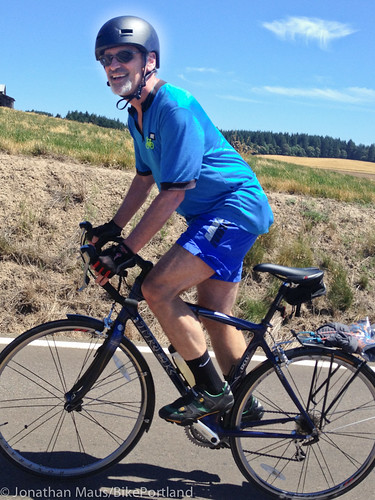
(Photo: J. Maus/BikePortland)
U.S. Congressman Earl Blumenauer introduced a bill today to help cities across the country to move forward with Vision Zero policies, plans and projects.
“The real ‘American carnage’ is what’s happening on our roadways,” Blumenauer shared with us today via email. “Something has to change. We have to do better and finally treat this public health crisis. Cities around the country are embracing Vision Zero. The federal government should too.”
The “Vision Zero Act of 2017” was co-introduced with Representative Vern Buchanan, a Republican from Florida.
The bill is split into two sections: One to fund the creation of Vision Zero plans, and the other that would fund the implementation of those plans. $5 million would be set aside each year for the next five years (starting in 2018) for the planning grants and $25 million a year for the implementation grants, which could be split by up to five different entities (any political subdivision of a state is eligible, including; towns, cities, counties, and so on).
This bill is similar to one Blumenauer introduced in 2015. This version however, offers a more detailed list of potential plan elements and reads like a list of Vision Zero best practices. Among the suggestions in the bill are, “an examination of how development and implementation of safety-focused automotive technologies, vehicle-to-vehicle communication, and vehicle-to-infrastructure communication can help eliminate transportation-related fatalities and serious injuries,” and “a focus on reducing speeds to the extent practicable within State law and separating modes of transportation.” The bill also specifically calls out the need for plans to, “equitably address the safety needs of low-income and minority communities and ensure that such communities are not disproportionately targeted by law enforcement.”
Advertisement
The bill also requires grantees to report back to Congress (and make available to the public) all the projects and programs funded by the grant and the demographics of the people who received the benefits of the grant.
For cities like Portland, who have already passed a robust Vision Zero Plan, the project implementation grant program requires 20 percent in local matching funds.
The timing of this bill is no accident. One week from today, hundreds of bike advocates from across the country will be on Capitol Hill as part of the National Bike Summit’s Lobby Day. The Vision Zero Act is one of three official “asks” the Summit’s organizers, the League of American Bicyclists, will encourage attendees to talk with their Senators and House Representatives about.
Before you get too excited about the impact this bill could have, consider that its passage isn’t likely. The 2015 bill had 32 cosponsors and only one of them, Rep. Buchanan, was a Republican. The bill never made it out of committee. With the 115th Congress being the most partisan of all time, the power of this bill will likely be in how it helps spur conversations about Vision Zero among advocates and lawmakers on The Hill.
— Jonathan Maus: (503) 706-8804, @jonathan_maus on Twitter and jonathan@bikeportland.org
BikePortland is supported by the community (that means you!). Please become a subscriber or make a donation today.


